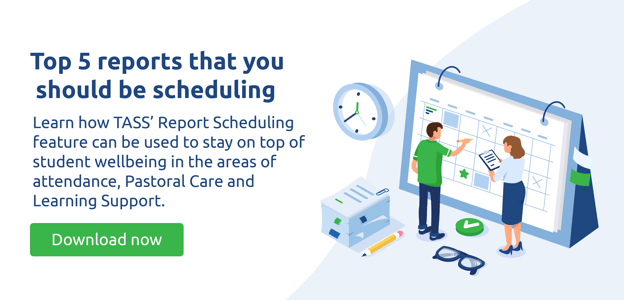Manage every aspect of your school's critical data.

Drowning in data? Tips to stay afloat in an ocean of information
It's no surprise that data is the key to forming strong insights. Studies have repeatedly shown that timely, relevant data is the key to ensuring students get the right support to achieve their learning and wellbeing goals.
However, with access to a truly overwhelming and ever-increasing amount of information, how do you sift through the noise to ensure you're tracking the right things at the right times?
Why is data-informed practice essential?
It may sound complex, but data-informed practice is the simple act of using tangible evidence and information to make decisions and draw conclusions. Whether you want to assess classroom performance, make informed financial decisions or keep an eye on student wellbeing, using relevant, quality data will help you be more efficient and effective, regardless of your role.
Studies have consistently shown that the use of quality student data makes for more effective educational decisions, helping staff to better identify areas of growth and allowing for the development of evidence-based plans for student’s academic, social and emotional improvement.
Taking advantage of your vast pool of student, administrative and financial information will allow you to see key trends at a glance, whether you want to stay informed about how you're tracking towards targets, monitor the results of a new program, or just keep up to date with important activities around your school.
Are you tracking the right data?
From academic achievement information to attendance, medical records, and financial reports, schools process an overwhelming amount of information each day. It can be tempting to think that more data is always better, but in reality, tracking and analysing figures that no one needs or uses is a huge time sink and can make it impossible to tell what's important and what's not.
By asking questions first, it's much easier to figure out what information you actually need. As AISNSW noted in their report:
"Without focused questions, the collection, analysis and use of data may be scattered, unclear and pointless."
Think about the kind of questions that arise naturally as part of your role - this could be related to areas you want to improve or even just things you want to keep track of, for instance:
- Has the new attendance policy had an impact on student absences?
- What behavioural incidents or achievements are happening in your Pastoral Care Group?
- Are there any learning gaps that need to be addressed?
- Are there any new enrolment trends that could be leveraged?
- Are staff making the most of their budget?
What kind of data should you be using?
Whether you're looking at quantitative data, such as grades and attendance records, or qualitative data, such as pastoral care notes and parent feedback, it's crucial that your data is high-quality if you want to draw meaningful insights and make solid decisions. So, what makes data high-quality?
Accuracy
It might seem obvious, but if your data isn't accurate, it won't help you make the right decisions. Incomplete data, conflicting records and unreliable information all make it difficult to form an effective analysis of anything. You can read some of our tips on cleaning up your data in this blog post.
Context
For data to be useful, it needs to have context. Looking at a single data point, such as an overdue payment, won't give much insight into why it's not been paid. Comparing this data with a family's entire billing history will let you know whether this is unusual, and looking at this in the context of the relevant class or year group will show you an even bigger picture. For example, if a surprisingly high number of families are late for this payment, you may discover that reminder emails weren't sent, or that parents may have been given unusually short notice, giving you the insight you need to improve your processes, or just reach out to families who may need support.
Relevance
Timely, relevant data is crucial in making meaningful decisions and analysis. Tracking academic performance on a consistent, regular basis or monitoring behavioural issues as they're flagged allows you to identify potential warning signs and take action before learning gaps get wider or problems progress.
How automation can help
Now that you know what data you're looking for, the challenge is finding time to access it. When you're already juggling a hundred different things, it can be easy to forget to run reports, leading you to miss valuable information that could have been actioned.
Setting reminders is a common band-aid solution, but whilst it may seem helpful at the time, you’re often just adding to the wall of noise from every other ping and notification. How often are you able to immediately action any of the non-stop reminders that can pile up from every other website, app and system in your work or personal life? It's all too easy to fall into the habit of ignoring and snoozing each reminder, and the endless array of notifications can leave you feeling overwhelmed and completely desensitised.
Think about how you will actually engage with each piece of information – what do you really need to be notified about immediately, and what would work better as a daily or weekly summary? Taking advantage of powerful automation and scheduling tools, as we've discussed before, can help take the effort out of reporting and reduce notification overload, sending timely digests of information straight to your inbox when and as often as you need them.
Deciding when and how you'll use a variety of data allows you to schedule reports around your needs, avoiding distracting and impractical notifications whilst giving you access to timely information when it's most helpful.
For instance, it's unlikely that everyone in your weekly pastoral care leaders meeting will have time to review each notification received during the week. Scheduling a recurring report for the morning of that meeting and having it sent to all attendees saves everyone time while ensuring that each person is informed before the meeting even starts.
Regardless of when or how often you need information, the important thing is that your data is working for you, not creating more work. For additional tips on how you could be using data to better inform your school, check out our top suggestions for reports you should be scheduling:


